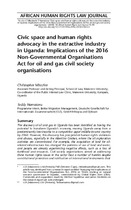Civic space and human rights advocacy in the extractive industry in Uganda: Implications of the 2016 Non-Governmental Organisations Act for oil and gas civil society organisations
Abstract
The discovery of oil and gas in Uganda has been identified as having the potential to transform Uganda’s economy, moving Uganda away from a predominantly low-income to a competitive upper-middle-income country by 2040. However, this discovery has precipitated human rights violations and abuses, especially in the Albertine Graben, where the oil exploration activities are concentrated. For example, the acquisition of land for oilrelated infrastructure has changed the patterns of use of land and water, and people are already experiencing negative effects, such as a loss of livelihood and resources. Civil society organisations aimed at addressing these human rights issues in the sector face a number of hurdles despite constitutional protection and ratification of international instruments that guarantee fundamental rights for CSO operations in the country. Currently, CSOs are governed by the recently-enacted Non-Governmental Organisations Act of 2016. This Act is accompanied by other laws, such as the Public Order Management Act. These laws have created several stumbling blocks that have frustrated CSO efforts in the fulfilment of their mandate. The weight of these laws is especially felt by NGOs working on sensitive issues such as natural resource governance. The article analyses the impact of the legislative framework governing CSOs, specifically the NGO Act, on organisations addressing or working on oil and gas issues in Uganda. In addition to the NGO Act, other pieces of legislation that have a direct bearing on the activities of these organisations are also analysed.

